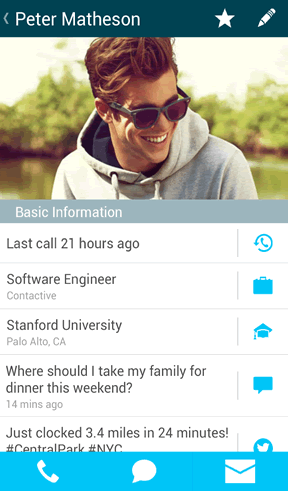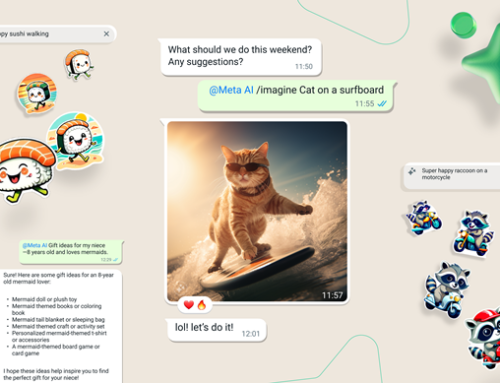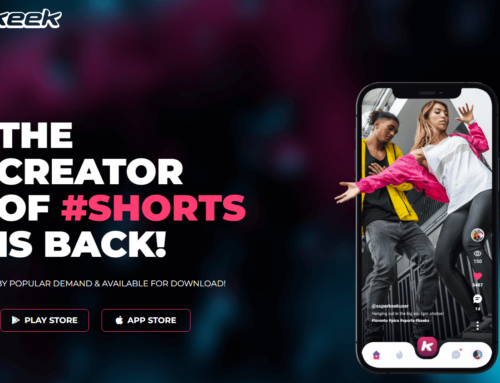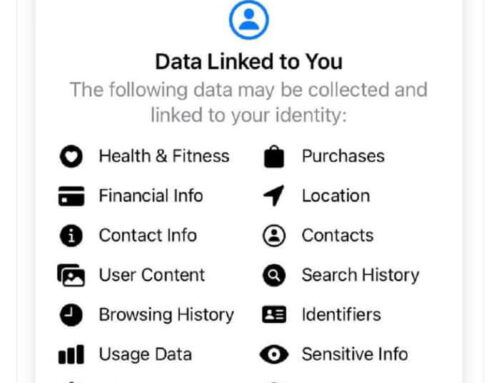Overview
Caller ID, also named calling number identification, is a phone service that transmits the number of the caller to the device of the person receiving it before the call is answered. Invented almost 45 years ago, it is the main method through which your phone can recognize who is calling you and even display the name of the caller if such as association was previously created. The most annoying human beings that use telephones, the telemarketers, are required (at least in the US) to use the caller id service thus disclosing their phone number when calling you to sell the ‘latest dial-up AOL card’ (as if it was still ‘95).
The problem is that caller id can be easily spoofed and some telemarketers intentionally hide or misguide it even if it is against the law to do so in certain countries. Maybe it’s fun to play a prank on your friend by using a caller id faker service (just Google to find it) and make it read ‘Mistress no. 1’ when he’s having dinner with his wife, but for sure is annoying as hell to receive a call late at night from someone that wants to sell something. US provides some protection against this by having a national do-not-call registry, which means you send your phone number in and supposedly no telemarketer will contact you, but it’s not obeyed by all of them.
Luckily there are solutions that can be installed on your phone that try to identify unknown caller id numbers. Contactive is an app for Android smartphones that tries to recognize unknown caller ids and show you who is in fact calling.
Design and Functionality
Iñaki Berenguer is one of the co-founders of the photo aggregator app Pixable that was sold for $26.5 million to Singtel, a telecom giant with almost half a billion clients. Instead of retiring to spend his money however, he gathered a team of highly skilled people and created Contactive. Intelligence agencies used the term ‘contact-ive’ (think of ‘operative’ to see the resemblance) for a sort of a black-book that had details on the multiple identities of foreign spies. Thus, by analogy, the Contactive app is your own little black-book where the identities of those that get in touch with you are revealed.
Contactive is a social address book that gathers information from a multitude of online resources to reveal the identity of those unknown caller ids or show you more details about people in your address book. It gets data from Facebook, Linkedin, Twitter, White/Yellow pages, Yelp, Google places, Gmail and Contactive’s global directory which accounts for millions of phone numbers. You can watch the presentation below to see it in action:
http://www.youtube.com/watch?v=9kPwTAvWexs
Here’s some scenarios where Contactive proves to be valuable:
- Lead conversion. A lead can be someone that just visited your website and is interested in finding out more about your products/services thus gives you a call. It’s up to you to convert that lead into a customer and Contactive helps you. When they give you a call the app will scour through its sources and show you as much information as it possibly can. Since it looks through the information publicly available, you can see their latest tweet or even address if they have that listed somewhere. It’s much more likely to convert a lead in a customer if you know more information about who’s calling.
- Telemarketing shield. When you see an unknown number on your phone you might think twice before answering it, as you never know who’s calling. However Contactive will look-up and if it’s a company that has at least a tiny-bit of information listed somewhere online, you’ll clearly see who’s calling. This way you’ll be able to answer a call from your dentist’s office that you’d have otherwise not answered for fear that it would’ve been a telemarketer with a strange accent (like mine, sic!).
- Friend trivia. Your address book most likely only holds telephone numbers and associated names, perhaps even an email in some cases. Contactive has a ‘pimp-my-addressbook’ mode and will go through all your entries enhancing them with information from social networking sites. Thus when your friend calls you can see what he last tweeted about, what was his status on Facebook, his current position via Linkedin, current location and other little details that you can use in your conversation.
- Search for anyone. You can use Contactive as a business directory as well. Trying to find a restaurant in your area, just search for it and Contactive will pull it up. Even more, when you’re trying to call a number that’s not in your address-book, Contactive will pull information about that number right when you make the call. Imagine calling a local restaurant and as you make the call Contactive shows you that they have a coupon code listed in their latest tweet – ka-ching!.
When you first start Contactive you are given the option to signup using Facebook/Twitter or create an account directly with them. The advantage of using one of your social accounts is that once that connection is in place, you don’t have to make any further associations for it (i.e. to get updates from Facebook for people in your address book). Contactive will then start the process of upgrading your address book. However it won’t affect your existing address book, it will create a copy of it so that if you later decide to uninstall the app your contacts won’t be affected at all.
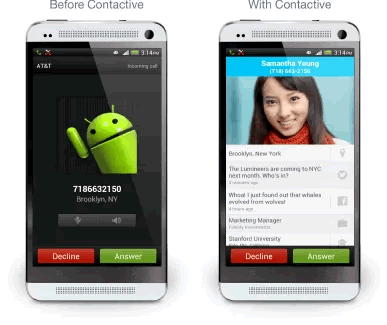
Call screen – with and without Contactive installed.
When the upgrade is done, you are ready to use the app. You can initiate calls by tapping on the ‘Keypad’ button and typing the desired number, see a history of your recent calls in the ‘Quick Call’ section, manage stored numbers via the ‘Contacts’ tab, group people in ‘Lists’ or read ‘Updates’ from social networks that you’ve connected with Contactive. Of course, you’ll need to login and connect the social networks that you use with the app to see these types of updates and have a better integration.
Here’s a list of features that Contactive offers for free:
- Detect caller ID. Contactive scours through hundreds of millions of phone numbers to find a match for the call you’re about to take (either when receiving a phone call or calling someone). No more unknown calls that you’re reluctant to answer. It also uses the information gathered from your social networks to give you details on contacts that also have a social profile. You can test how this works by calling an unknown number, say the number of the restaurant close by that you like – Contactive will pull up the associated information (name, location, what they’ve shared on social networks) and display it to you before making the call.
Callerid recognition for an unknown call
- Social address book. With Contactive you get a unified address book, one that not only includes your regular contacts in the phone’s memory, but also details about them from the social networks you are connected with. You can see this in action when you will receive a call from someone that is also connected with you via a social network (Linkedin, Twitter, Facebook, WhatsApp …). You will see the profile of the caller with a photo pulled from his/hers online account, the last status updates or tweets, where they currently work and so on. Now you’ll have more to talk to them about as in a few seconds you’ve seen what happened to them lately. Furthermore, you can use Contactive to search for any type of information and it will automatically show you results (i.e. when you’re looking for a close by bar, or someone from your high-school).
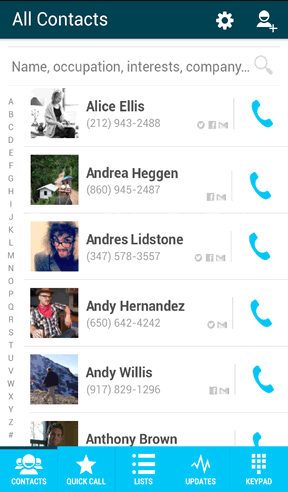
Your contacts with details from social accounts
- Contact lists. Contactive will group your contacts in lists based on the social networks they were pulled from (if any). The neat thing about lists is that you can send an email to all those belonging to a particular group/list.
- Social updates. Contactive will also pull up information from your social networks and display them in the Updates section.
Read latest tweets or status updates from the call screen
- Security. You might think that once you give your phone number to Contactive, it will be publicly available. That’s not the case at all, the app will protect your phone number and if someone searches for your name in their directory, they won’t see your phone number. However if they do a search using your phone number, they’ll find your name too. You can do reverse phone lookups with it but only when you already know the phone number of the person you’re looking for.
- Call management. As mentioned earlier, Contactive will not alter your phone’s address book, instead it creates one of its own based on the contacts you have. Also, when you give it permission to replace the default Android call screen Contactive will ‘intercept’ any calls that come through or go out and it will use its enhanced address book to display information. This is also one of the reasons Contactive is not available for iOS, as Apple doesn’t allow any app to replace the default call management one, even if you want to. +1 for Android.

During a call you see details from social networks.
Conclusion
Contactive is ‘proudly made in NYC’ and after using it for even a few minutes you can tell that is one of the big players in this niche of social address book / universal caller id apps. It will unify information from all your social networks and give you new conversation subjects right when you make the call. Your address book (the enhanced one) is stored in the cloud on Contactive’s servers, so in case something goes wrong you can easily restore it. The fact that they’re backed by Singapore’s leading telecom company can be considered as an extra reason to trust the app with your phone numbers, so privacy is not an issue. If you don’t want something stored with them, you can send an email and they’ll remove everything they have related to your account.
You can read more about it via their official website or visit Google Play to get it: Download Contactive.

Name: Contactive
Developer: Contactive
Size: Varies with device
Package: com.contactive.apk
Version: 1.0
Last update: August 19, 2013
Price: Free
Press Release
Contactive, a big data company that focuses on real-time identity, celebrates on April 9th, 2014, the first anniversary of the beta launch of its CallerID app for Android smartphones. Launched one year ago this week, Contactive’s free CallerID app has changed the way people are making decisions about the calls they answer, by providing users with valuable information on unknown numbers in the moment that matters most: right when the phone rings. By automating the process of Googling phone numbers and names, scanning public directories, and sifting through multiple social network updates, Contactive instantly displays the most vital information about a caller as the call is coming in. In its first year, over 100,000 people have become active Contactive users and are enjoying enhanced information on their incoming calls, including photos, names, companies, addresses, or social updates. This makes their calls more productive and enhances the quality and efficiency of their communications.
“We are thrilled to be at the one year mark and couldn’t be prouder of the CallerID app,” said Iñaki Berenguer, Contactive CEO. “The platform has changed so much over the last year, but one thing has stayed the same: our desire to help users be prepared to interact with each other, providing a profile of anyone they interact with, in real time, on their native apps, with no effort, and leveraging existing information.”
The team continues to grow in New York City with 13 engineers, computer scientists, and mathematicians working on the product platform. Contactive CallerID has significantly improved its capabilities over the past year, measured by key statistics like the time to resolve a call in real time and the amount of telephone numbers it can resolve. Contactive CallerID identifies about 85% of the incoming calls in the U.S. in under two seconds, which is significantly better than anyone in the industry and much less time than the average seven seconds it takes most people to answer their phones.
To kick off its second year Contactive is working on several new initiatives and developing exciting partnerships on top of the Contactive Identity Graph. “We believe users are hungry for technology solutions that can make their daily routines more productive,” explained Berenguer. “Contactive is putting muscle behind complex big data problems to deliver identity information that helps people be more productive. We think that CallerID is just the beginning.”


